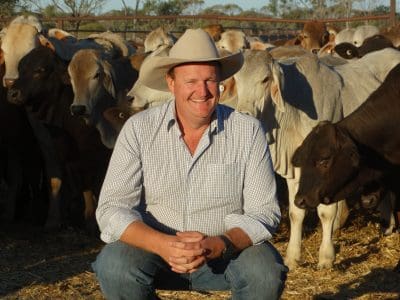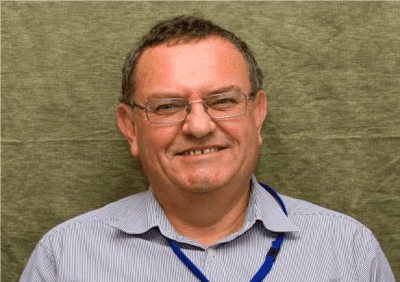Prominent beef industry stakeholder Troy Setter has been appointed chairman of Australia’s Council of Rural Research and Development Corporations, following the departure of the previous chair John Woods.
The Council acts as a central communicator on behalf of Australia’s 15 Research & Development Corporations, working with industry on the value of the model.

Troy Setter
The 15 Rural RDCs cover agriculture, fisheries and forestry industries in Australia. Each is tasked with delivering tangible and practical improvements for their industries in terms of productivity and profitability, sustainability, and the community. They do this through strategic and targeted investments in and partnerships for research, development and adoption, and in some cases, market access, market development and promotion.
With more than 20 years’ experience in executive roles across the livestock sector, Mr Setter brings a clear vision for the Council to continue to invest in growing the profitability and sustainability of Australia’s Rural Industries, a release issued today states.
Mr Setter said Australia has a globally enviable structure with its RDCs that invest industry and government funds in the R&D and marketing of Australian food and fibre.
“We must continue to build on the excellent work our RDCs have done over many years,” he said.
Alongside his position as CRRDC chair, Mr Setter is the chief executive officer for Consolidated Pastoral Co, a large, privately owned, Australian agrifood business. He was previously chief operating officer of Australian Agricultural Co, and earlier held executive positions with agribusinesses including North Australian Cattle Co, Torrens Investments, Elders feedlot division and Twynam Group. He has worked across the agribusiness supply chain in production through to processing and marketing for beef, sheep, grains, cotton, land development and logistics.
Mr Setter currently also chairs the board of Dolly’s Dream and LiveCorp, and was the former chair of the Australian Beef Industry Foundation and several other organisations.
Along with holding a degree in Rural Science from University of New England, he has completed the Agribusiness program at Harvard Business School and The Australian Rural Leadership Program.
Biosecurity gets new inspector general
Meanwhile Dr Lloyd Klumpp has been appointed as Australia’s next Inspector-General of Biosecurity.

Dr Lloyd Klumpp
An independent biosecurity consultant with qualifications in veterinary science and 40 years’ experience in science-based work, including in biosecurity programs across animal and plant industries and the natural environment, Dr Klumpp takes over the reins from 25 July from retiring inspector general Rob Delane.
Dr Klumpp was formerly the general manager at Biosecurity Tasmania, and has worn many hats during his four decades worth of experience in the biosecurity and animal health field.
Agriculture minister David Littleproud said the IGB position was formally established under the Biosecurity Act 2015, with Dr Klumpp being only the third appointment.
“I congratulate Dr Klumpp on his appointment to this important role providing assurance over Australia’s biosecurity risk management systems through independent evaluation and verification,” the Minister said.
Biosecurity Training Centre
Meanwhile DAWE has this week signed an agreement with Charles Sturt University to establish a new Biosecurity Training Centre to strengthen Australia’s biosecurity capability.
Departmental secretary and Australia’s director of biosecurity, Andrew Metcalfe, said DAWE was pleased to enter into the partnership with CSU to strengthen Australia’s preparedness and resilience against biosecurity threats.
The new Biosecurity Training Centre is expected to be open for business from 1 July and will support the training of more than 300 biosecurity officers in its first year of operation.
The centre would replace the previous decentralised training arrangements and ensure the most modern training arrangements are available to all biosecurity officers across Australia.
“A centralised hub in Wagga Wagga in regional Australia, with additional training facilities in several state capitals and access to research capability, will support our training requirements and build a future ready, skilled and agile workforce,” Mr Metcalfe said.
“Australia’s biosecurity system relies on strong partnerships across government, industry, the community and with other countries to help manage pest and disease risks.
“People underpin our entire system and the Biosecurity Training Centre will offer greater professionalism, structure and rigour to ensure our regulatory teams have the best training program possible.”
Head of the Biosecurity Group within the department and chair of the national biosecurity committee, Andrew Tongue, said the training centre would deliver specialised training for biosecurity staff to manage and respond to the increase in biosecurity risks in a challenging and changing environment.
“Global trade disruption is driving an ever-changing pest and disease threat that we must be able to respond to. The centre will provide the department with opportunity to work with our partners to increase our capability to respond to these threats, and in time, make training available to industry and Australia’s near-neighbours,” Mr Tongue said.
“The establishment of a dedicated Biosecurity Training Centre is critical to ensure our officers have access to the best training and decision-making tools available to perform their roles as skilled and professional regulators, capable of making lawful, transparent, and accountable regulatory decisions.
“We are incorporating new technologies, which CSU can support us with, in our training programs to provide contemporary modern ways to support our officers in understanding how important it is to protect our agricultural industry.”
The outgoing head of the IGB Rob Delane, led a number of key reviews, including into the adequacy of border measures to mitigate the risk of African Swine Fever, robustness of biosecurity measures to prevent entry of khapra beetle, and the implementation of inspectors-general recommendations.

Big congratulations to Troy Setter. He will have to become very practiced at the juggling game with the number of hats he is wearing although I am sure he will just take it in his stride. He has come a long way since I used to regularly visit him as a nutrition & veterinary consultant when he managed a feedlot near Wagga Wagga in NSW